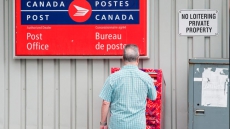TORONTO — Every holiday season workers at the Salvation Army anxiously check the mail for a flurry of envelopes.
The Christian charity usually receives most of its donation cheques in November and December, but this year the pile of envelopes coming in is a lot smaller.
According to the charity's national director of marketing and communications John McAlister, the recent Canada Post strikes are to blame for a 40-per-cent decline in the number of donations its direct-mail program has received so far.
"Many of our supporters choose to give each year between November and December and even those who give throughout the year boost their support during this time," he said. "We rely heavily on our mail program. (The strike) is quite concerning for us. We are really hoping this trend will not continue."
McAlister said the decline in donations puts a strain on the 1.7 million people the charity helps annually through housing and shelter, food, disaster aid, camps and church services.
He said problems stemming from the lack of donations are worsened by the timing.
"As we move into extreme cold weather across the country, we start to boost the number of services," he said. "We offer more out-of-the-cold beds, warm meals and supports for vulnerable people, including giving out free clothing."
Fewer donations mean his team has to look more closely at how many people they can help.
McAlister said he has been encouraging donors to give online through the Salvation Army's website or to drop off cheques at the organization's centres.
Disruptions to postal service have been occurring since Oct. 22, when members of the Canadian Union of Postal Workers began rotating walkouts to push for their contract demands: hourly pay rates for rural and suburban carriers equivalent to what urban letter-carriers are paid, better job security and minimum guaranteed hours.
The walkouts have caused delays and the unsorted mail and packages at postal depots has piled up.
Canada Post estimates major sorting centres in Toronto, Montreal and Vancouver might be backlogged for weeks, perhaps even into next year, even if the rotating strikes stopped right away.
The Liberal government is moving back-to-work legislation through the House of Commons, while still calling on Canada Post and the Canadian Union of Postal Workers to negotiate a new agreement.
